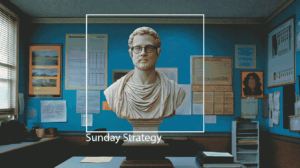There’s nothing like swapping roles to look back and see your career so far in a new way. As I prepared to switch jobs recently, I realised that as of February 2024, I had been working in advertising for over 16 years. Additionally, this week is my one year anniversary of moving back to the US after spending the last 15 years before in the UK.
In that time, I’ve been lucky enough to work as a strategist in creative, media and integrated agencies, as well as co-founding my own consultancy. I had gone from an intern (who showed up in a suit and tie on his first day – for the last time in my career to date) through to head of strategy and CSO roles.
Anyone who knows me knows I’m the last person who should be giving out advice, but this got me thinking… What would I say now to the overdressed, very eager me sitting in the lobby of a media agency in Central London in 2008?
If you’re not a very out of place, slightly nervous intern then please look away – or at least take these with a grain of salt.
1.) Smart Ideas Impress, Effective Ideas Recruit.
Throughout my career, I’ve had this sentiment told to me and demonstrated in many different ways. An agency I was with called it ‘finding right, instead of being right’. I personally found after a long period of time the difference between an interesting presentation and a motivating one. People nod after an interesting strategy presentation, but they jump in and build on one that recruits them.
That’s because effective ideas aren’t just smart (though it always helps if they are), but they leave space for others to pick it up and run with it. They create deeper understanding that can inspire ownership, excitement and recruit them as supporters. Many hard things require more than one smart person and even if they don’t, they’re a lot easier to do when you have help. Recruitment and support increase an idea’s probability of success – something at the core of strategy.
This isn’t to say that you don’t have a unique role to play as a strategist. Smart conversations win you capital. Smart ideas get people excited. But to move beyond impressing people to making something that truly works is going to require others and can’t exist in isolation. Make sure an idea isn’t so smart, that it can’t recruit supporters.
My first boss once told me the best thing I could do is ‘Find the most important person in the room and ask them what keeps them awake at night’. Every time I’ve done that I’ve found that I instantly had a supporter because I had something that was rooted in usefulness.
Most importantly, give your ideas the legs to move beyond yourself and run to others. Write things down. Share them. Hone how you communicate them. An idea isn’t really real, until someone else can pick it up and engage with it.
2.) Your Best Advertising Ideas Come From Outside of It.
There is a sentiment about creativity that’s always resonated with me, which has been articulated in different ways by Jobs, Plomer, Beveridge, Gould and advertising’s own Rory Sutherland – that creativity is the connection of two previously unrelated things. I believe good strategy is ruthless in how it identifies a problem and creative in how it things about why it exists and how to solve it.
Therefore, creativity needs a broad and deep well to draw from – something that goes beyond the well worn dogma, case studies and cause celibre of the industry itself. Advertising, and strategy, takes in intellectual strays from other fields and becomes stronger because of it – despite fostering a predisposition to look inwardly once joining.
One of the best strategists I ever hired came out of an interview where we discussed if planes were the most impactful inventions in the world. I knew he could execute the fundamentals of strategy before the interview based on previous work, but his insight into relating his belief to areas of business, culture and technology made him the right person for what we were building.
This isn’t to say careers progress based on the esoteric, but instead that once you’ve proven the required craft and skills to execute, inspiration can sit on top of this in a broader way. Inspiration is often found away from the office, progress is made inside of it.
3.) You’ll Always Have a Boss, Even If You’re the Boss.
Responsibility is the cost of experience and skill, not just seniority. With time you become responsible to more people, not less. A good manager, leader or founder is still responsible to the C-suite, the board, the client, the market or the bank – as well as, most importantly, to everyone they manage. You collect bosses with time, but you also get more latitude to do this your way for them.
The ceiling on a career is limited less by your ability and more by what level of responsibility you’re willing to take on. When you begin to progress in your career, you discover that cost at every level and you have to decide if you’re still willing to pay a rising cost to go for the next one. I have a suspicion that the people who would have been the smartest CEOs, presidents and leaders in the world never were, because they decided to ‘spend’ their resource elsewhere. As Douglas Adams once said more succinctly, “Anyone who is capable of getting themselves made President should on no account be allowed to do the job.”
4.) The Quality of Your Career (and Your Life), is Measured By the Amount of Difficult Conversations You Can Have Well.
Being able to talk about, not just say, difficult things to people in a way that still respects them is one of the most important skills in life and in any career, but it is particularly valuable to a strategist. The distinction here is found in ‘talking’ not just ‘saying’. Anyone can push a brutal truth out into the world and its easy to romanticise this as just being ‘candid’, but respect is only gained when you own up to and consider the impact of what’s being said.
As a strategist you’re paid to tell difficult truths when needed, all in the aim of getting organizations to see the world as it is, not as they’d like it to be. Being the one to have to say something difficult is hard, but it doesn’t excuse you from considering the best way to deliver it and make it into a conversation.
As a manager or leader, difficult conversations are part of the job. However, the best leaders are those that can do it in a compassionate way. While it’s unrealistic to think you can make difficult news, feedback or issues painless, its your responsibility to consider and mitigate as much pain as you can. “I’m just telling the truth” is often used to mask a lack of consideration about what that truth may do. Discussing the truth goes further.
5.) Perfection Is An Unhelpful Excuse
Perfection is a myth. It’s subjective and often limited. There are no perfect answers because there isn’t perfect information available to us. Even if something could be crafted to perfection, the world changes around it. Perfection in strategy, careers and life acts as a destination to arrive at, ignoring that our client’s businesses, the market, consumers, culture and the goalposts we aim for constantly move. To try and make something perfect ignores that you will always have to adapt. Adapt your strategy to shifts. Adapt your campaigns to changes. Adapt your career to setbacks.
However, the acknowledgement that nothing is perfect doesn’t excuse us from trying to make something great. Instead, it highlights that putting our best educated guess out into the world is the start of a process, not an end. Squiggly careers, curvy campaigns and adapted ideas are all borne from thinking and intention strong enough to adapt. That requires more work to make, not less. Perfection seems hard, but is an easy out. Adaptation seems easy, but is deceptively hard to execute.
6.) You’ll Forget, Ignore and Relearn These Over and Over Again.
I have yet to fully learn all the things I’ve just written down. Often times, I completely forget them. I imagine my younger self might know this. At best, he’d ignore this and at worst he’d call me a hypocrite.
He’d probably say I’ve been very lucky. That I’ve experienced a massive amount of privilege. That these ideas aren’t relevant to what he’s doing. And he’d be right on all counts.
The reality is that understanding isn’t constant and the ideas, observations and insights you use to live your life or shape your career change with it – hopefully to be adapted or replaced with something better. Any advice is more for the person giving it than the person receiving it and it needs to be translated.
These are what I’ve learned right now, but that will change tomorrow. I’m sure in 15 years, an older, greyer and wiser me won’t have added to this list, but re-written it completely. Here’s to finding out what will have changed.



